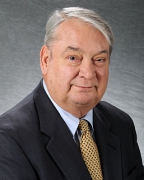Awards
- Honorary Degree - 2012
- D.S.
- Groundbreaking for Neuroscience Building
- Indianapolis, Indiana
- Presenter: Michael A. McRobbie
- Nobel Prize - 1998
- Nobel Prize in Physiology or Medicine

Pharmacologist Ferid Murad received the 1998 Nobel Prize in Physiology or Medicine with Robert F. Furchgott and Louis J. Ignarro "for their discoveries concerning nitric oxide as a signaling molecule in the cardiovascular system."
A native of Whiting, Indiana, Murad attended DePauw University in Greencastle, where he earned his undergraduate degree. In the summers during college he took courses in mathematics and literature at one of IU's regional campuses, while also working to earn money for school. In 1958 he entered the newly established M.D./Ph.D. program at Case Western Reserve University, where he earned a doctorate in pharmacology as well as his medical degree.
He then served an internship and residency at Massachusetts General Hospital, before going to the National Institutes of Health as a clinical associate in the Heart Institute. In 1970 he was hired by the Department of Medicine at the University of Virginia, where he established the new Clinical Pharmacology Division. He became director of the Clinical Research Center in 1971 and director of Clinical Pharmacology on 1973. While at UVA, he conducted his first experiments on the biological effects of nitric oxide.
In 1981 Murad became chief of medicine at the Palo Alto Veterans Hospital, a Stanford University-affiliated institution. He was also a professor of internal medicine and pharmacology and associate chairman of medicine at Stanford. After serving as acting chair from 1986 to 1988, he left to become vice president of Abbott Laboratories. He left Abbott in 1993 to found a new biotech company, Molecular Geriatrics Corporation. In 1997 he returned to academia, becoming the first chair of a newly formed Department of Integrative Biology, Pharmacology, and Physiology at the University of Texas-Houston. He became director of the Institute of Molecular and Cellular Signaling at George Washing University in Washington, D.C.
Murad's discovery that nitric oxide causes blood vessels to relax and widen has far-reaching applications in medicine today. It is used to regulate blood pressure; fight infection; and treat heart and lung conditions, as well as cancer, shock, and impotence.